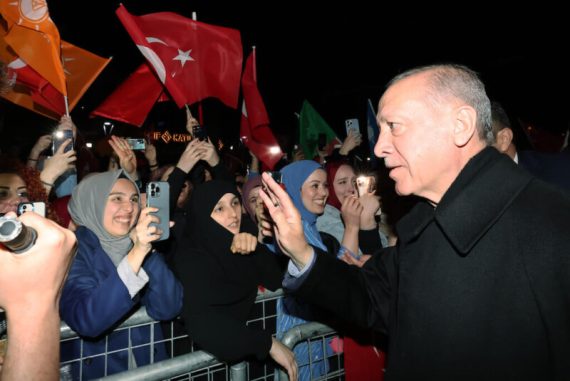O
n May 14, Turkey held one of its most critical elections in recent history. While on the one hand, the ruling Justice and Development Party (AK Party) led by President Recep Tayyip Erdoğan was confident enough to win the parliamentary elections and lead the presidential one in the first round, the Nation Alliance was committed to end the two-decade-rule of President Erdoğan. President Erdoğan is seen as the favorite in the runoff presidential elections to be held on May 28 with a scorecard that includes many positive developments from democratization to gains in foreign policy, and accelerated development projects to the increasing capabilities of the Turkish defense industry. On the other hand, the Turkish opposition had claimed that they were closer than ever to ending the 21-year rule of the AK Party and its leader.
In their election campaigns, the People’s Alliance highlighted national security concerns and the moves that paved the way for Turkey’s independence in domestic and foreign policy, and the Nation Alliance conducted a campaign that focused on economic challenges and delivering unconvincing messages to the youth and women. It was clear that the Nation Alliance’s absurd proposals such as reducing onion prices instead of producing unmanned aerial vehicles (UAVs) which have become one of the most critical instruments of Turkey’s national security and foreign policy, drew the reaction of voters.
The elections were held in a competitive, yet democratic environment. President Erdoğan won the presidential election with 49.5% of the votes, but as he did not receive the 50+1 votes required to become president, a runoff is required. The fact that the Nation Alliance received around 45% of the votes revealed that the Republican People’s Party (CHP) and the other members of the coalition did not have a successful election strategy nor could they accurately understand the voting behavior of the Turkish voters.
As both domestic and international observers are trying to make sense of the election results, it would be useful to make some related observations. First, the picture that emerged with the end of the May 14 elections is that Turkish voters prioritize national security issues and projects in areas that are seen as a matter of survival for Turkey rather than focusing on economic difficulties. At this point, the decisiveness of the AK Party and the Nationalist Movement Party (MHP), the two prominent components of the People’s Alliance, in the fight against terrorism and their independent foreign policy are the two most important factors that pushed Turkish voters to vote for them.
Turkey, which has become a game-changer in conflict and crisis areas in its immediate geography thanks to its defense industry, is taking important steps both to protect regional interests and increase its international reputation as a broker in Ukraine, Syria, Libya, and Azerbaijan. In addition to this, thanks to its strong UAV capacity and operational know-how, Turkey maintains its cross-border operations, and in this way, the durability and flexibility of the PKK terrorist organization in Turkey have almost ended. Although the defense industry projects introduced by the Turkish government were appreciated by almost every segment of Turkish society, the CHP developed a discursive opposition to these projects, causing them to lose votes in the May 14 elections.
In a recent interview, Ünal Çeviköz, one of the CHP’s most important names, harshly criticized Turkey’s Libya policy and asked, “What are we doing in Libya?” However, the “Blue Homeland” Doctrine, which was put forward by Turkey regarding the protection of maritime jurisdiction areas in the Mediterranean, placed Libya at a critical point. By being involed in the crisis on behalf of the UN-recognized government, the balance of power in Libya has improved in favor of Turkey’s interests, and Turkey has pushed many regional and international actors into retreat.
Recommended
Similarly, senior officials of the CHP started a disinformation campaign against the support given to the Azerbaijani army during the Second Nagorno-Karabakh War. Çeviköz, CHP’s Chief Advisor for Foreign Relations at the time, claimed that Turkey had sent Syrian mercenaries to Karabakh, and later retracted his words. In the following days, the Azerbaijani army achieved a historic victory with the support of Turkey and an important territory was recaptured by Azerbaijan after signing a peace agreement with Armenia.
On the other hand, the CHP’s relationship with the Green Left Party (YSP), which is affiliated with the PKK, received a significant reaction from nationalist Turkish voters. Unlike the determination of the People’s Alliance in the fight against terrorism, the covert alliance of the CHP with the YSP caused Turkish voters to view the People’s Alliance as critical to the survival of Turkey. With the election of Kılıçdaroğlu as president, voters feared that Turkey would weaken in its fight against terrorism. Additionally, the strategy followed by President Erdoğan in Syria stands out as the biggest obstacle to the PKK’s forward-looking territorial and independence demands.
Overall, the May 14 elections revealed a picture in which nationalist voters were influential and voters put national security issues at the forefront. Despite the elections being held in the shadow of economic difficulties and a destructive earthquake, the Turkish people made their choice in favor of the continuity of national policies and stability. Also, the results show that the Turkish people question the opposition in terms of their political cadres and potential national policies. In contrast, the People’s Alliance’s main election agenda of “nationhood” and “national security” resonated with and gave hope to voters.





